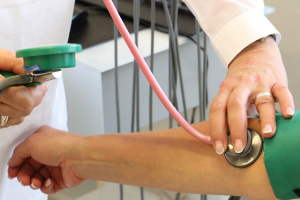CoQ10 supplementation at a rate of 200-300 mg/day is safe, well-tolerated, and effective. Supplementation increases significantly the level of Coenzyme Q10 in the blood plasma. It inhibits lipid peroxidation processes and limits oxidative damage [Rabanal-Ruiz 2021].

Regular supplementation with Coenzyme Q10 is associated with improved survival, reduced hospitalization, less oxidative stress, less systemic inflammation, and lower systolic blood pressure.
In its role as a lipid-soluble antioxidant, Coenzyme Q10 protects heart muscle tissue and other tissues against the damage caused by harmful free radicals. Consequently, the regular use of CoQ10 supplements is associated with significant reductions in mortality and hospitalization rates in heart failure patients [Mlynarska 2024].
CoQ10 supplementation is also associated with a significant reduction in inflammatory markers and total cholesterol levels. Moreover, evidence from clinical studies suggests that Coenzyme Q10 lessens arterial blood pressure and reduces the extent of vasoconstriction [Mlynarska 2024].
Biological Mechanisms of CoQ10 Supplementation
CoQ10 supplementation contributes to improved clinical outcomes in heart disease patients in the following ways [Rabanal-Ruiz 2021; Mlynarska 2024]:
- Reduces oxidative stress
- Decreases vascular stiffness
- Reduces blood pressure levels
- Improves endothelial dysfunction
- Improves left ventricular ejection fraction
- Increases nitric oxide levels for better vascular dilation
- Increases ATP energy synthesis in the heart muscle
Coenzyme Q10 and Heart Failure
CoQ10 supplementation contributes to significantly improved symptoms and survival in heart failure patients [Mlynarska 2024]:
- A 2023 meta-analysis of data from studies of the impact of CoQ10 supplementation in heart failure patients demonstrated favorable effects on heart function that correlate positively with a reduction in mortality and hospitalization rates [Alarcon-Vieco 2023].
- The 2014 Q-Symbio international multi-center study showed that chronic heart failure patients who received a daily dose of 300 mg of the ubiquinone form of Coenzyme Q10 had a reduced risk of major adverse cardiovascular events compared to the placebo group [Mortensen 2014].
- In a 2023 review, Fladerer & Grollitsch found that documentation of beneficial effects of the oxidized form of Coenzyme Q10 (ubiquinone) in reducing the rate of cardiovascular death in heart failure patients. They did not observe the same effect for the reduced form of Coenzyme Q10 (ubiquinol).
Coenzyme Q10 and Coronary Artery Disease
Oxidative stress and low-grade chronic inflammation contribute to the formation of atherosclerotic plaque in coronary arteries.
- A 2019 systematic review revealed that CoQ10 supplementation contributes to a reduced levels of blood biomarkers for lipid peroxidation and reduced levels of inflammatory markers [Jorat 2019].
- A 2022 meta-analysis of randomized controlled trials indicated that CoQ10 supplementation can decrease the blood levels of total cholesterol, LDL-cholesterol, and triglycerides [Liu 2022].
- A 2022 study of the effects of specific antioxidants cardiovascular diseases showed that Coenzyme Q10 reduced the concentration in blood of total cholesterol, LDL-cholesterol, and triglycerides. The researchers inferred that CoQ10 supplementation can have a more effective hypolipidemic effect than such antioxidants and micronutrients as vitamin C, vitamin D, lycopene, quercetin, and resveratrol [An 2022].
Coenzyme Q10 and Hypertension
Hypertension is an important risk factor for the development of many forms of cardiovascular disease.
- A 2022 meta-analysis showed that CoQ10 supplementation significantly reduced systolic blood pressure, compared to the control group. However, there was no similar significant effect on diastolic blood pressure. A daily dose of 100-200 mg of Coenzyme Q10 had the best efficacy in decreasing systolic blood pressure [Zhao 2022].
- A 2018 analysis of data from 17 randomized controlled trials (with 684 participants) also revealed that CoQ10 supplementation significantly decreased systolic blood pressure. The data indicated a trend toward decreased diastolic blood pressure. But, this trend was not statistically significant [Tabrizi 2018].
- In a 2022 review, An et al found that CoQ10 supplementation was more effective in lowering blood pressure than vitamin C, lycopene, isoflavones, and flavonoids were but less effective than resveratrol or L-arginine [An 2022].
Conclusions: Coenzyme Q10 Protects Against Heart Disease
The overproduction of free radicals can lead to oxidative stress. Oxidative stress is a significant risk factor for the development of heart disease. Coenzyme Q10 is an important lipid-soluble antioxidant [Mlynarska 2024].
Coenzyme Q10 protects the heart muscle and other tissues against lipid peroxidation processes. CoQ10 supplementation also contributes to reductions in blood biomarkers of inflammation and to reductions in total cholesterol levels. CoQ10 supplementation helps to reduce arterial blood pressure and to relieve vasoconstriction [Mlynarska 2024].
Consequently, CoQ10 supplementation is associated with reductions in mortality risk and hospitalization rates [Mlynarska 2024].
All commercially available CoQ10 supplements are not equal in effect. It is important to find a CoQ10 product that has been tested for absorption, bioavailability, and clinical efficacy [Lopez-Lluch 2019; Mortensen 2014].
Sources
Alarcón-Vieco E, Martínez-García I, Sequí-Domínguez I, Rodríguez-Gutiérrez E, Moreno-Herráiz N, Pascual-Morena C. Effect of coenzyme Q10 on cardiac function and survival in heart failure: an overview of systematic reviews and meta-analyses. Food Funct. 2023 Jul 17;14(14):6302-6311.
An P, Wan S, Luo Y, Luo J, Zhang X, Zhou S, Xu T, He J, Mechanick JI, Wu WC, Ren F, Liu S. Micronutrient supplementation to reduce cardiovascular risk. J Am Coll Cardiol. 2022 Dec 13;80(24):2269-2285.
Fladerer JP, Grollitsch S. Comparison of Coenzyme Q10 (ubiquinone) and reduced Coenzyme Q10 (ubiquinol) as supplement to prevent cardiovascular disease and reduce cardiovascular mortality. Curr Cardiol Rep. 2023 Dec;25(12):1759-1767.
Jorat MV, Tabrizi R, Kolahdooz F, Akbari M, Salami M, Heydari ST, Asemi Z. The effects of coenzyme Q10 supplementation on biomarkers of inflammation and oxidative stress in among coronary artery disease: a systematic review and meta-analysis of randomized controlled trials. Inflammopharmacology. 2019 Apr;27(2):233-248.
Liu Z, Tian Z, Zhao D, Liang Y, Dai S, Liu M, Hou S, Dong X, Zhaxinima, Yang Y. Effects of Coenzyme Q10 supplementation on lipid profiles in adults: a meta-analysis of randomized controlled trials. J Clin Endocrinol Metab. 2022 Dec 17;108(1):232-249.
López-Lluch G, Del Pozo-Cruz J, Sánchez-Cuesta A, Cortés-Rodríguez AB, Navas P. Bioavailability of coenzyme Q10 supplements depends on carrier lipids and solubilization. Nutrition. 2019 Jan;57:133-140.
Mlynarska E, Hajdys J, Czarnik W, Fularski P, Leszto K, Majchrowicz G, Lisińska W, Rysz J, Franczyk B. The Role of antioxidants in the therapy of cardiovascular diseases-a literature review. Nutrients. 2024 Aug 6;16(16):2587.
Mortensen SA, Rosenfeldt F, Kumar A, Dolliner P, Filipiak KJ, Pella D, Alehagen U, Steurer G, Littarru GP; Q-SYMBIO Study Investigators. The effect of coenzyme Q10 on morbidity and mortality in chronic heart failure: results from Q-SYMBIO: a randomized double-blind trial. JACC Heart Fail. 2014 Dec;2(6):641-9.
Rabanal-Ruiz Y, Llanos-González E, Alcain FJ. The Use of Coenzyme Q10 in cardiovascular diseases. Antioxidants (Basel). 2021 May 10;10(5):755.
Tabrizi R, Akbari M, Sharifi N, Lankarani KB, Moosazadeh M, Kolahdooz F, Taghizadeh M, Asemi Z. The Effects of Coenzyme Q10 supplementation on blood pressures among patients with metabolic diseases: a systematic review and meta-analysis of randomized controlled trials. High Blood Press Cardiovasc Prev. 2018 Mar;25(1):41-50.
Zhao D, Liang Y, Dai S, Hou S, Liu Z, Liu M, Dong X, Zhan Y, Tian Z, Yang Y. Dose-response effect of Coenzyme Q10 supplementation on blood pressure among patients with cardiometabolic disorders: a grading of recommendations assessment, development, and evaluation (GRADE)-assessed systematic review and meta-analysis of randomized controlled trials. Adv Nutr. 2022 Dec 22;13(6):2180-2194.
The information presented in this review article is not intended as medical advice. It should not be used as such.









Leave A Comment